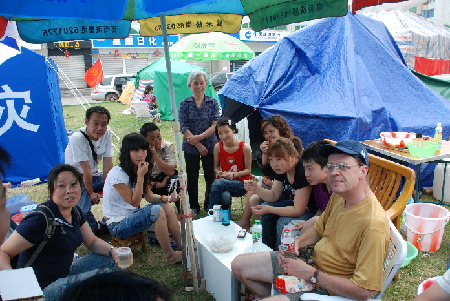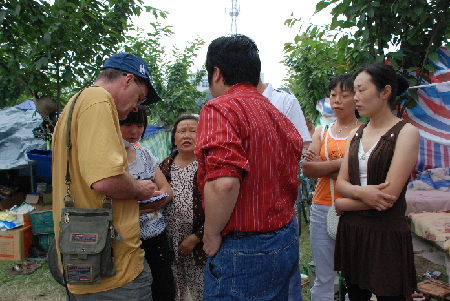A caretaker allows us into the courtyard to inspect his apartment block. He warns us to be careful. It is clearly risky. The ground floor of the block is buckled and bent, and the bricks are cracked and broken.
Another man comes to speak to us. He too is critical of the local authority. "Where are they?" he asks us, obviously distressed. "We never see them!"
Others are more cheerful. As ever, they are delighted to see a Western face. They compete to make me welcome in their shelters, offering me food and water that they can hardly spare. Children who can speak a little English are pushed forward by parents and instructed to "talk to the waiguoren". As ever, they respond by blushing and squirming.

Some still manage a smile.
In the central square there are a large number of people gathered. One man speaks to us at great length. He is a writer, and he shows us papers he has written about the problem. He hopes to write an open letter to the Central Government.
His message is direct and uncompromising – local government is not doing enough. They are wrong if they think that things are satisfactory. Mianzhu's position is critical, and the losses outside of the metropolitan area cannot be counted only in numbers. He asks us for help in getting his appeal across.
There are a number of serious points to be made here.
The first is that it is clear that we encountered a level of anger in Mianzhu City.
The second is that this finding needs to be placed in context.
We spoke to a small number of people, probably a couple of dozen. We should therefore be wary of assuming that what we heard was representative of a more general feeling. Additionally, when you speak to groups of people, the views you hear will inevitably come from those with the loudest voices. It is never safe to assume that the people with the loudest voices are speaking for all the others.

Others have a point to make.
The next point is important too. The people of Mianzhu are suffering hardship. Their lives are uncomfortable and monotonous. But they are not starving, nor are they currently a medical emergency.